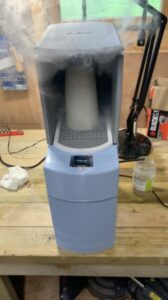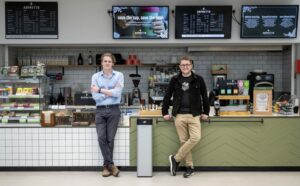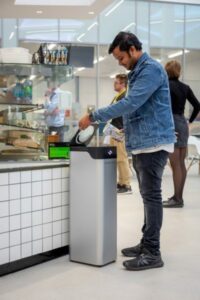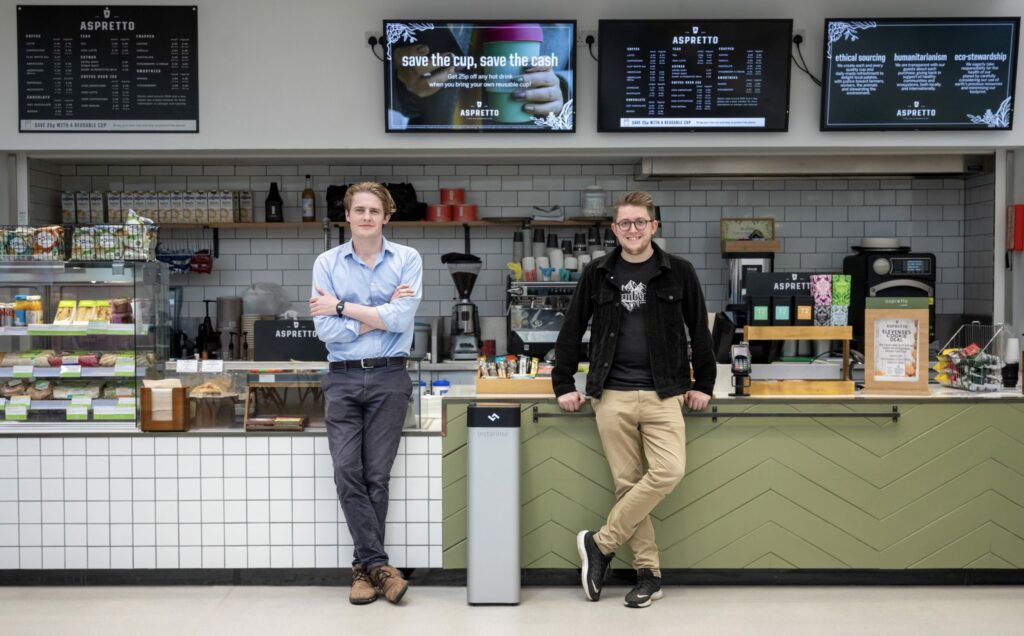With the aim of reducing the 2.5 billion disposable coffee cups the UK throws away each year, Bristol-born Lava Labs has set out to build an innovative new product to encourage reusable use.
InstaRinse is an all-new appliance that enables users to rinse their reusable coffee cup in under 15 seconds using minimal energy and water. Whether it’s in the coffee shop, office space or any other communal area, InstaRinse tears down one of the largest barriers to consistent reusable use.
Motivated by his mother’s frustration over the lack of reusable cleaning facilities in coffee shops, in summer 2019, co-founder Theo Todd decided to create a solution. Armed with an Arduino and a friend’s 3D printer, he built the initial prototype.
On returning to his final year of economics at the University of Bristol, Theo showed the prototype to a friend, Charlie Peach, who was studying engineering. The pair of them then embarked on a journey to bring the idea to life, with backing from the university’s new enterprise scheme.

The InstaRinse prototype
“The purpose of the product has never changed. It’s a quick way for people to wash their reusable coffee cup while on the go.” Theo explains.
“During lockdown we spent three months in my garage building the next iteration, focusing on answering key questions such as: is this product even possible, will it be manufacturable in the future, and is it something people will be drawn to use?”
“When we finished the second prototype coffee shops weren’t even open. But it was enough to get meetings with people and to create content that we could use to demonstrate how it’s used to potential customers.”
With another year left of his course, Charlie went back to university in September, leaving Theo to take the business forward.
“It was at this point we met Bunzl, a global supplier who have been very supportive of the venture. Their support showed me that this product was worth pursuing and that I shouldn’t give up.”

Theo & Rory, co-founders of Lava Labs
In April 2021 Theo met his current co-founder Rory Taylor, who brought with him a wealth of experience from his time working as an engineer at Dyson.
“Rory brought a whole load of fresh ideas and an understanding of the process from design all the way through to manufacture. This propelled us forward to create the latest prototype, which is a shift from the original design.” He continues.
“We recently launched our first public trial of the product with Sodexo, the world’s second largest contract caterer. It’s important that we bring these larger customers on board from the outset to achieve the necessary scale, but also to ensure that we can get large numbers of people using the product and therefore have the sustainability impact we aim for.”
The trial gave the team an insight into the way people use the product, how it fits into the busy environment, and the safety considerations of hosting a product like this in a communal space.
“Our aim now is to step up our R&D efforts and create a highly reliable, modular product to ensure the long-term maintenance of the product is as simple as it can be for our customers. We’re working with SABRE, the EU-funded programme run in the Bristol Robotics Laboratory, sharing their expertise and advanced equipment, as well as the Institute of Bio-Sensing Technology to investigate the sanitisation properties of our system. We aim to output our next iteration mid 2023.”

SODEXO trial of the InstaRinse
Efficiency is extremely important to the overall product, which only uses 25ml of water to wash a reusable cup in 15 seconds. This uses far less water than it takes to wash the cup under a tap, making it more cost-effective for companies to consider moving away from single-use cups.
Creating a modular product also helps to make it more sustainable, allowing long-term customers to easily upgrade their wash units over time, without having to replace the whole system. This ties in with InstaRinse’s hardware-as-a-service business model.
“Future Space has been extremely helpful on our journey”, continues Theo. “We’ve done various collaborations with the BRL, Health Tech Hub, and the Centre for Print Research, as well as receiving a lot of innovation support from the team here too.”
“We currently have four interns working with us funded through the Future Space and UWE Bristol programmes, as well as the Green Skills programme, who have supported us with the public trial and market research.”
With more funding coming their way in the shape of an Innovate UK grant, helping them to invest in new talent and accelerating their R&D (more on this coming in January), it looks like things are definitely on the up for the team at Lava Labs.

